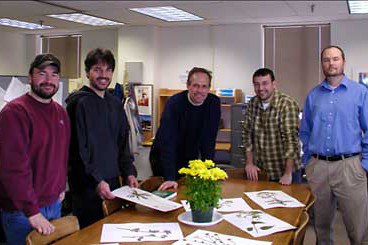The goal of our research is to inform the development of integrated, multi-tactical weed and crop management strategies that are both economically and ecologically sustainable.
Our lab focuses on understanding the ecological principles that underpin crop production and weed population and community-level dynamics. We use a variety of approaches, including field and greenhouse experiments and simulation modeling. The goal of our research is to inform the development of integrated, multi-tactical weed and crop management strategies that are both economically and ecologically sustainable.
The majority of our field research is conducted at the Penn State Russell E. Larsen Agricultural Research Center in Rock Springs, PA (upper left).
We quantify weed emergence, survivorship, fecundity, and propagule survivorship in the soil.
Members of our group have developed a new hypothesis suggesting that below-ground weed-crop competitive interactions may be mediated by soil resource pools.
Organic management often produces yields that are comparable with conventional cropping systems, despite higher weed populations.
In many plants, seed germination and seedling emergence respond to environmental cues (such as soil temperature or moisture) that indicate favorable growth conditions.
In addition to soil conservation and soil improvement, cover crops can be useful tools for weed suppression.
We communicate our research findings to the agricultural community through a variety of outreach activities.
Investigators involved in this project.


